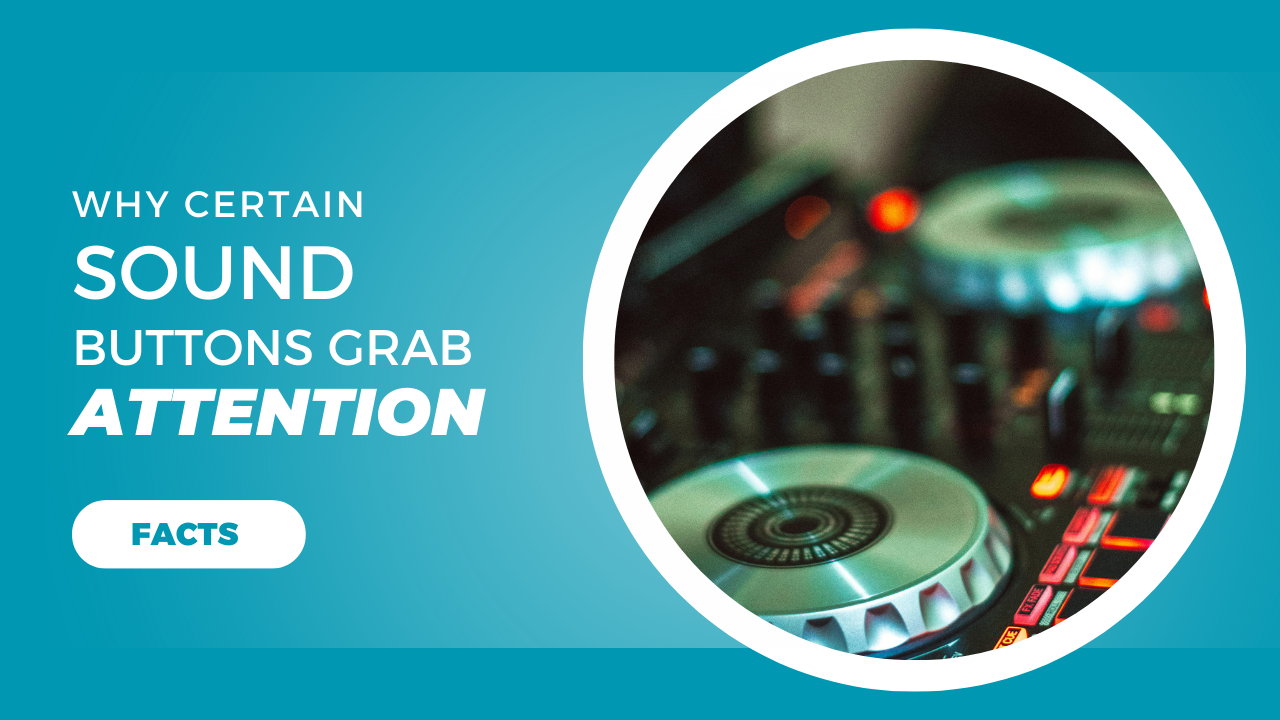The Science of Sound: Why Certain Sound Effects Grab Our Attention
Sound is a force that shapes how we think, feel and behave. Certain sounds instantly demand our attention; from a crying baby to a phone notification. But have you ever taken a moment to consider why this is the case? Why do some sound effects appear to insist on our attention, while others make themselves heard only at the periphery? The answer can be found in the intriguing science of sound and the way our brains interpret audio clues. This article will look at what in us makes us respond the way we do to sound effects, the psychology and biology behind it, and what these insights are being used for in areas such as marketing, education, and entertainment.

What Is Sound and How Do We Hear It?
Sound, in its simplest form, is a vibration moving through air in waves. Our ears pick up these waves, which are translated into electrical signals understandable by our brain. Different sounds have different pitches (high or low tone) and volumes (loud or soft), and our brains respond differently to each.
When a sound enters our ears, three main stages are involved:
External Ear: Gathers the sound waves.
The Middle Ear: Then, the middle ear amplifies the sound vibrations.
The Inner Ear: Transduces vibrations into electrical signals and sends them to the brain.
These signals are then processed in our brain, which determines whether sound is significant or not. This quick analysis takes place in milliseconds, and it’s one reason that a sudden loud bang can make you jump immediately.
Why Do Certain Sounds Grab Our Attention?
1. Loud and Sudden Sounds
They grab our attention instantly, as something loud and jarring, like a car horn, an alarm bell, etc. This happens because our brain has combined abrupt, loud sounds with danger. With this in mind, he suggests that a freakout of sorts is a survival mechanism harkening to centuries past, when humans needed to respond quickly to threats in their environment.
2. High-Pitched Sounds
High-pitched noises, like a crying baby or a whistle, are made to pierce through background noise. Our brains are particularly attuned to those frequencies because they tend to indicate something urgent that we need to do something about.
3. Familiar Sounds
Sound be right for everyone like a phone call or doorbell may trigger a certain kind of reaction in people's brains. These sounds get everyone's attention because we are trained to recognize them.
4. Emotional Triggers :
Some sounds may have an emotional impact. For instance, the sound of rain can make you feel calm, while a siren on an ambulance simply sounds urgent and unnerving. The emotional stories associated with sounds can also make them more unforgettable and noticeable as well.

The Role of Sound in Psychology
Sound doesn't simply impinge upon our hearing Why not influence our emotions, behavior and memory as well? Psychologists have studied the way different sound effects can induce particular responses :
'Fight -or-Flight Response' stage: A sudden loud noise makes our brain go apeshit with the fight-or-flight reflex, releasing adrenaline and quickening our heart rate.
Positive feedback: Happy sounds, such as applause or chime music, make feel proud and happy.
Memory Improve: Some sounds to listening (like one's favorite piece of music, or a well-known jingle) may bring back old emotions and memories that are very powerful indeed.
This sound psychology is utilized in marketing, education, and entertainment to shape behavior and enhance experiences.
How Marketers Use Sound Effects to Grab Attention
Be honest with yourself: don’t you sometimes feel as if you 're living in a trailer for a movie, and the music is just right on cue? You are not imagining it. Marketers deliberately use sound effects to draw your attention and manipulate your actions.
Instances of Sound Effect in Marketing.
Notification Sound: The annoying short beeps on apps are meant for you to turn and take out your smartphone.
Jingles: The brand sticks in your head when there is a musical advertisement or catchy little song to accompany it.
Attention-Grabbing Warnings: When business is being done, notices come with exciting sounds to show that time is short for this very good offer—pay now!
Marketers realize that sounds have the power to make a message more captivating and lead customers to act.
Sound Effects in Education
In the classroom, sound effects are effective tools for teaching. Teachers use sounds to attract students' attention, signals transitions between activities, and reinforce key lessons.
How Sound Aids Learning:
Focus: A ringing bell or chime can refocus a class that has wandered.
Rewards: Applause sound signals can inspire students.
Memory: Repeated sound cues can help students remember what they have learned
With sound effects added, classes become livelier, more than ever interesting and unforgettable.

Sound Effects in Entertainment
Movies, video games, and live shows all rely heavily on sound effects to arouse emotions and keep the audience tuned in.
Where sound matters in entertainment:
Suspense: in a fearful scene, a muffled, distant sound will create tension.
Feeling:gentle instrumental music makes romantic scenes even more touching.
Realism: in video games the sounds of footsteps, explosions and the environment combine to provide an all-encompassing feeling that is hard to separate from real life.
When viewers or players are played with by the sounds of whatever type, great thinkers with an ear for quality sound are carefully chosen to elicit different emotions and keep you tuned in.
The Science Behind Iconic Sound Effects
Some sound effects people hear and instantly recognize. like the ding of a message notification, or the whoosh as it goes out to an email. These sounds are not random—each is carefully designed to correspond with the operation it represents.
Why Do These Sounds Work?
They are brief and to the point, so to speak. This makes them easy to recognize.
They are neither irritating nor especially emotional, keeping it clean.
They are repeated often, which gives them a recognizable consistency.
The Future of Sound Effects
As technology evolves, the use of sound effects will continue to grow. Right now AI is used to make smart sound experiences for people. For example:
Smart Home Devices: When Alexa and Google Home respond to sound cues, the message is conveyed both through the tone of voice and another mechanism-- synchronization with these devices.
Virtual Reality (VR): Radically-seeming sound effects make for a more life-like virtual world.
Accessibility Tools: Sound effects let visually impaired individuals navigate apps and devices with more ease.
In the future, sound effects may become even more personalized and fit the user's preferences.
Conclusion :
Forget sound effects as nothing but background noise— they actually possess the power of a magic key which seizes attention, evokes emotions, and can make eternal memories. Whether it’s a loud alarm or a gentle ping for notification, every sound is critically shaped to fulfill a design With so many devices continuing to require sound effects, from radios and aircraft warnings in the past to modern automobiles today, it seems clear that somewhere else they will be found. How deeply sound touches our everyday lives can be shown by examining the science behind sounds
For example, in advertising, educational audio-visuals and other new media products, sound effects will be used as primary tools of communication. You might attribute a striking sound to many factors, but the main reason is simply that it grabbed your attention. So next time you hear a sound effect remember to stop and think why it did so. Chances are it ’s doing much more science than you realise!